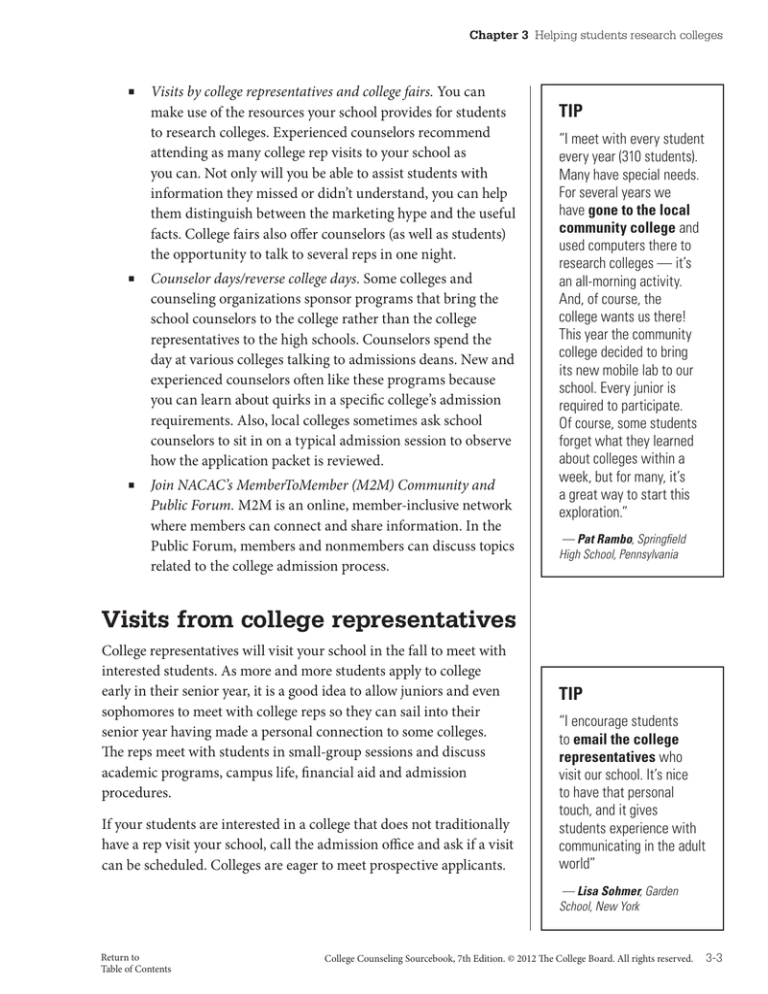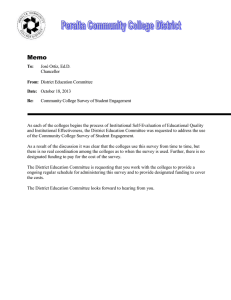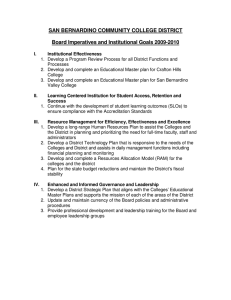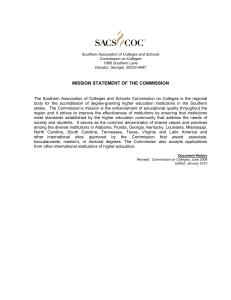
Chapter 3 Helping students research colleges
■■ Visits by college representatives and college fairs. You can
make use of the resources your school provides for students
to research colleges. Experienced counselors recommend
attending as many college rep visits to your school as
you can. Not only will you be able to assist students with
information they missed or didn’t understand, you can help
them distinguish between the marketing hype and the useful
facts. College fairs also offer counselors (as well as students)
the opportunity to talk to several reps in one night.
■■ Counselor days/reverse college days. Some colleges and
counseling organizations sponsor programs that bring the
school counselors to the college rather than the college
representatives to the high schools. Counselors spend the
day at various colleges talking to admissions deans. New and
experienced counselors often like these programs because
you can learn about quirks in a specific college’s admission
requirements. Also, local colleges sometimes ask school
counselors to sit in on a typical admission session to observe
how the application packet is reviewed.
■■ Join NACAC’s MemberToMember (M2M) Community and
Public Forum. M2M is an online, member-inclusive network
where members can connect and share information. In the
Public Forum, members and nonmembers can discuss topics
related to the college admission process.
Tip
“I meet with every student
every year (310 students).
Many have special needs.
For several years we
have gone to the local
community college and
used computers there to
research colleges — it’s
an all-morning activity.
And, of course, the
college wants us there!
This year the community
college decided to bring
its new mobile lab to our
school. Every junior is
required to participate.
Of course, some students
forget what they learned
about colleges within a
week, but for many, it’s
a great way to start this
exploration.”
— Pat Rambo, Springfield
High School, Pennsylvania
Visits from college representatives
College representatives will visit your school in the fall to meet with
interested students. As more and more students apply to college
early in their senior year, it is a good idea to allow juniors and even
sophomores to meet with college reps so they can sail into their
senior year having made a personal connection to some colleges.
The reps meet with students in small-group sessions and discuss
academic programs, campus life, financial aid and admission
procedures.
If your students are interested in a college that does not traditionally
have a rep visit your school, call the admission office and ask if a visit
can be scheduled. Colleges are eager to meet prospective applicants.
Tip
“I encourage students
to email the college
representatives who
visit our school. It’s nice
to have that personal
touch, and it gives
students experience with
communicating in the adult
world”
— Lisa Sohmer, Garden
School, New York
Return to
Table of Contents
College Counseling Sourcebook, 7th Edition. © 2012 The College Board. All rights reserved. 3-3
Chapter 3 Helping students research colleges
A counselor should be available, whenever possible, to greet the
college rep. In a recent discussion on the NACAC website on the
topic of whether college Websites have reduced the need for college
rep visits, many college representatives said not only did they value
the visit, but a chief goal was to meet the counselors, and to create or
perpetuate a relationship with them.
Tip
“Bridges’ Choices
Planner does a good job
assessing trade schools
and certificate-level
programs, like automotive
or cosmetology programs.
We have significant
numbers of students
considering technical
training beyond high
school in addition to our
traditional college-going
population.”
— Tom McNeil, Winslow
High School, Maine
Students should be encouraged to meet with a number of college
representatives. Quite often, the rep will be a reader of their
application, and putting a face to a name is always helpful. Students
might decide a college is not right for them after the rep visit — that
helps them better define the type of school they are looking for.
If possible, sit in on the rep’s presentation. Often, students are shy,
and the counselor can ease the tension by asking a few questions
to get the discussion going. In addition, attending presentations is
an excellent way to know what a college is really like. Be sure to get
copies of recent materials from the rep to update your files.
Make sure all college reps receive each of these items:
■■ A school profile
■■ A college statistics list (colleges that students from your
school have attended in recent years)
■■ Your business card
■■ Directions to other local high schools
Finally, make sure the representative feels welcome and appreciated.
If possible, provide a quiet location in which they can meet with
students (not the cafeteria during lunch). A convenient parking
spot should be arranged if possible, and lunch or a snack should be
provided if they are coming at midday. All of this can go a long way
toward leaving reps with a positive impression of the school and its
students.
You and your students can prepare for a rep’s presentation. See
Handout 3E: Questions to ask college representatives.
3-4 College Counseling Sourcebook, 7th Edition. © 2012 The College Board. All rights reserved.
Return to
Table of Contents
Chapter 3 Helping students research colleges
strategies for learning what colleges are
really like
“If at all possible, sit in on every college rep’s visit to your school.”
— Steve DiPietro, former school counselor
“I go on college tours (usually the counselor pays the air fare, and the
colleges provide transportation, housing and meals). And whenever
I’m near a college, I take the student tour. If it’s a college my students
are typically interested in, I contact the person in admission who will
be reading the applications from my school and talk with them.”
— Peggy Hock, co-director of college counseling, Notre Dame High School, California
“Combine brief college visits with your family vacation plans. If you
are on a tight budget over the summer, ask about an overnight stay in
a dormitory. Many colleges will be happy to accommodate you and
your family in return for an hour or two of your time.”
— William Yarwood, Moorestown High School, New Jersey
“Not all online college search programs are legit. Some sites don’t
actually have an official association. I check websites to see if they
have any information for counselors. This usually tells me if they are
legit or not.”
— Tamuriel Grace-McKinley, Beloit Memorial High School, Wisconsin
“It’s really important for counselors to visit colleges. They learn a lot
about one college specifically, but they also learn about colleges in
general, even from a single visit. And, of course, the bonding that
occurs with the other counselors is of lasting value.”
— Lynda Molyneaux, Central High School, Nebraska
“If there is a college that you need to learn more about because your
students are applying or plan to apply there, call the admission office
and schedule a visit. You are all in the same business — they want to
get to know counselors and prospective students.”
— Susie Rusk, counselor coordinator, Washoe County School District, Nevada
Return to
Table of Contents
College Counseling Sourcebook, 7th Edition. © 2012 The College Board. All rights reserved. 3-5
Students
TITLE
College planning: How to get started
TITLE
Get started.
Assess your strengths, weaknesses, goals, passions, learning style and social skills. What is most
important to you in the college-search process? What do you hope to gain from the process?
Make some basic decisions.
Where do you want to live? Will you go to college full-time? Part-time? Do you want to attend a
single-sex school, a technical college, a public or private college, a large university, a small liberal
arts college, or a historically black or religiously affiliated college? How important to you is the
cultural/ideological diversity of the student body?
Enlist help.
Who do you want to assist you in this process (parents, teachers, siblings, relatives, friends)?
Consult references and websites.
Look at college directories (College Board College Handbook, Barron’s, Peterson’s) and use college
searches (www.collegeboard.org). Visit the websites of the colleges that interest you.
Talk with your teachers and your school counselor about your dreams and goals.
Discuss your plans with your parents. Ask for their advice.
Meet with college representatives when they visit the school.
The guidance office will post information on upcoming visits. Have questions ready.
Visit campuses every chance you get.
Take a tour, meet with an admissions representative and ask students what they think of the
college.
Source: Amherst Regional High School, Massachusetts
Handout 3A
College Counseling Sourcebook, 7th Edition. © 2012 The College Board. All rights reserved.
Permission granted to copy this for educational purposes.
Students
TITLE
College resources for students and families
TITLE
General websites
Campus Tours: Virtual College Tours. Virtual tours with still pictures and descriptions, webcams, campus maps
and videos of hundreds of colleges throughout the United States. Provides a first look at colleges.
www.campustours.com.
The College Board. A complete site, with college and scholarship searches, information about the SAT® and SAT
Subject Tests™, and other material pertaining to the college search and application process. Easy-to-use college
search feature. www.collegeboard.org.
eCampusTours.com. Virtual tours of colleges. Useful for its 360-degree views of dorm rooms and other buildings.
www.ecampustours.com.
NCAA Eligibility Center. Official NCAA website that gives details of student-eligibility requirements to play
NCAA sports. Watch this site for changes in eligibility; students can print the “Guide for the College-Bound
Student-Athlete.” http://web1.ncaa.org/eligibilitycenter/common/
Peterson’s Education Portal. An all-purpose site including a college search, as well as information about summer
programs, summer camps and jobs. The site asks you to register before using some of the search engines and other
resources, but there is no registration fee. There is a charge for some of the services provided. www.petersons.com.
U.S. Department of Education. The federal government’s website is easy to use and an excellent source of
information on financial aid, much of it in Spanish as well as English. www.ed.gov.
Financial aid websites
The College Board. Has a scholarship search, a loan calculator and an online application form for the
CSS/Financial Aid PROFILE® form, which is required by some colleges. www.collegeboard.org.
FAFSA on the Web. The website for the Free Application for Federal Student Aid. This form must be submitted in
the senior year (after January 1 and by June 30) for families applying for need-based aid. Students may complete it
electronically at this site. www.fafsa.ed.gov.
FastWeb. Extensive information on merit- and need-based scholarships and aid. www.fastweb.com.
FinAid! Good site for information about types of financial aid and applying for financial aid. www.finaid.org.
Books
Comprehensive objective directories
Barron’s Profiles of American Colleges. New York: Barron’s Educational Series, Inc. Updated every two years.
The College Board College Handbook. New York: The College Board. Published annually.
Peterson’s Guide to Four-Year Colleges. Princeton, NJ: Peterson’s Guides. Published annually.
Peterson’s Guide to Two-Year Colleges. Princeton, NJ: Peterson’s Guides. Published annually.
Handout 3L page 1 of 2
College Counseling Sourcebook, 7th Edition. © 2012 The College Board. All rights reserved.
Permission granted to copy this for educational purposes.
College resources for students and families (page 2)
Subjective guides
Fiske, Edward, and Robert Logue (contributor). The Fiske Guide to Colleges. Naperville, Ill.: Sourcebooks Trade.
Updated annually.
Greene, Howard, and Matthew W. Greene. Greene’s Guide to Educational Planning: The Public Ivies. New York:
HarperCollins, 2001.
Greene, Howard R., and Matthew W. Greene. The Hidden Ivies: Thirty Colleges of Excellence. New York:
HarperCollins, 2000.
Pope, Loren. Colleges That Change Lives: 40 Schools You Should Know About Even If You’re Not a Straight-A Student.
New York: Penguin, 2006.
Staff of Yale Daily News. The Insider’s Guide to the Colleges. New York: St. Martin’s Press. Updated annually.
Specialized topics
Aaron, Scott. Jewish U: A Contemporary Guide for the Jewish College Student. New York: Urj Press, 2010
College Board Book of Majors. New York: The College Board. Published annually.
Detailed descriptions, written by professors, of more than 180 popular majors, plus lists of 900 majors and the colleges that
offer them.
Getting Financial Aid. New York: The College Board. Published annually.
Mathews, Jay. Harvard Schmarvard: Getting Beyond the Ivy League to the College That Is Best For You. New
York: Prima Publishing, 2003. Good insights on the college choice process from the education columnist for the
Washington Post.
Nelson Reference. Nelson’s Complete Guide to Colleges & Universities for Christians. 2002.
Princeton Review et al. (eds.). The Hillel Guide to Jewish Life on Campus. 14th ed. New York: Random House
Information Group, 1999.
Princeton Review et al. (eds.). K&W Guide to Colleges for Students with Learning Disabilities or Attention Deficit
Disorder. 8th ed. New York: Random House Information Group, 2005.
Schoem, David. College Knowledge: 101 Tips for the College-Bound Student. University of Michigan Press, 2005.
Practical advice on how to become engaged in college intellectual and cultural life.
Windmeyer, Shane L. The Advocate College Guide for LGBT Students. Boston: Alyson Publications, 2006.
Handout 3L page 2 of 2
College Counseling Sourcebook, 7th Edition. © 2012 The College Board. All rights reserved.
Permission granted to copy this for educational purposes.
Parents
TITLE
College questionnaire
for
parentsTITLE
or guardians
Name of Student: _______________________________________________________________
1. Do you have a preference for how far from home your child’s college is located?
2. Do you have a preference for an urban, suburban or small-town campus?
3. Indicate any preferences you have for the location of your child’s college:
Southeast
Midwest
Southwest
Northeast
West Coast
No preference
Northwest
4. Do you have a specific preference for: a public college/university?
a private college/university?
a college with a religious affiliation?
no preference
5. Please list specific colleges/universities you would like your child to learn about.
6. What particular area of study interests your child?
Handout 3J page 1 of 2
College Counseling Sourcebook, 7th Edition. © 2012 The College Board. All rights reserved.
Permission granted to copy this for educational purposes.
College questionnaire for parents or guardians (page 2)
7. How do you view your child’s actual academic progress so far?
8. What do you believe are your child’s strengths in applying for college?
a. Academic strengths:
b. Other strengths:
9. You are invited to write a letter to the college counselor describing your child, specifically
narrating events or anecdotes that characterize or illustrate your child’s personality. What
would you like us to know about your son or daughter? What experiences have shaped his
or her personality? What makes your child special? Are there special circumstances you
would like the college adviser to know about that would help with the college search? What
do you hope your child will gain from the college experience?
Parent/Guardian Name(s):_____________________________________ Date: _______________
_____________________________________________________________________________
Source: Susan Staggers, Cary Academy, North Carolina
Handout 3J page 2 of 2
College Counseling Sourcebook, 7th Edition. © 2012 The College Board. All rights reserved.
Permission granted to copy this for educational purposes.






